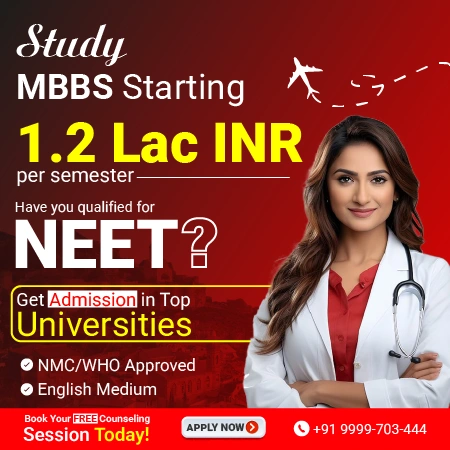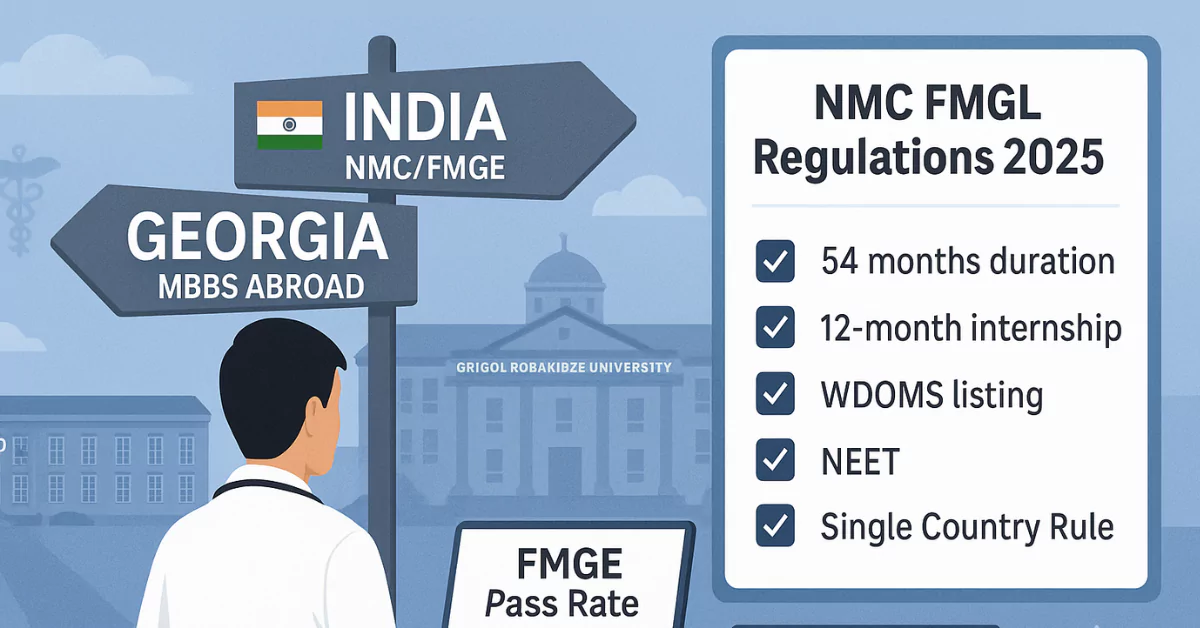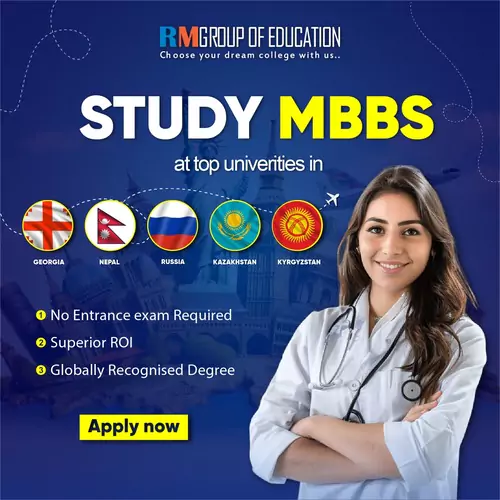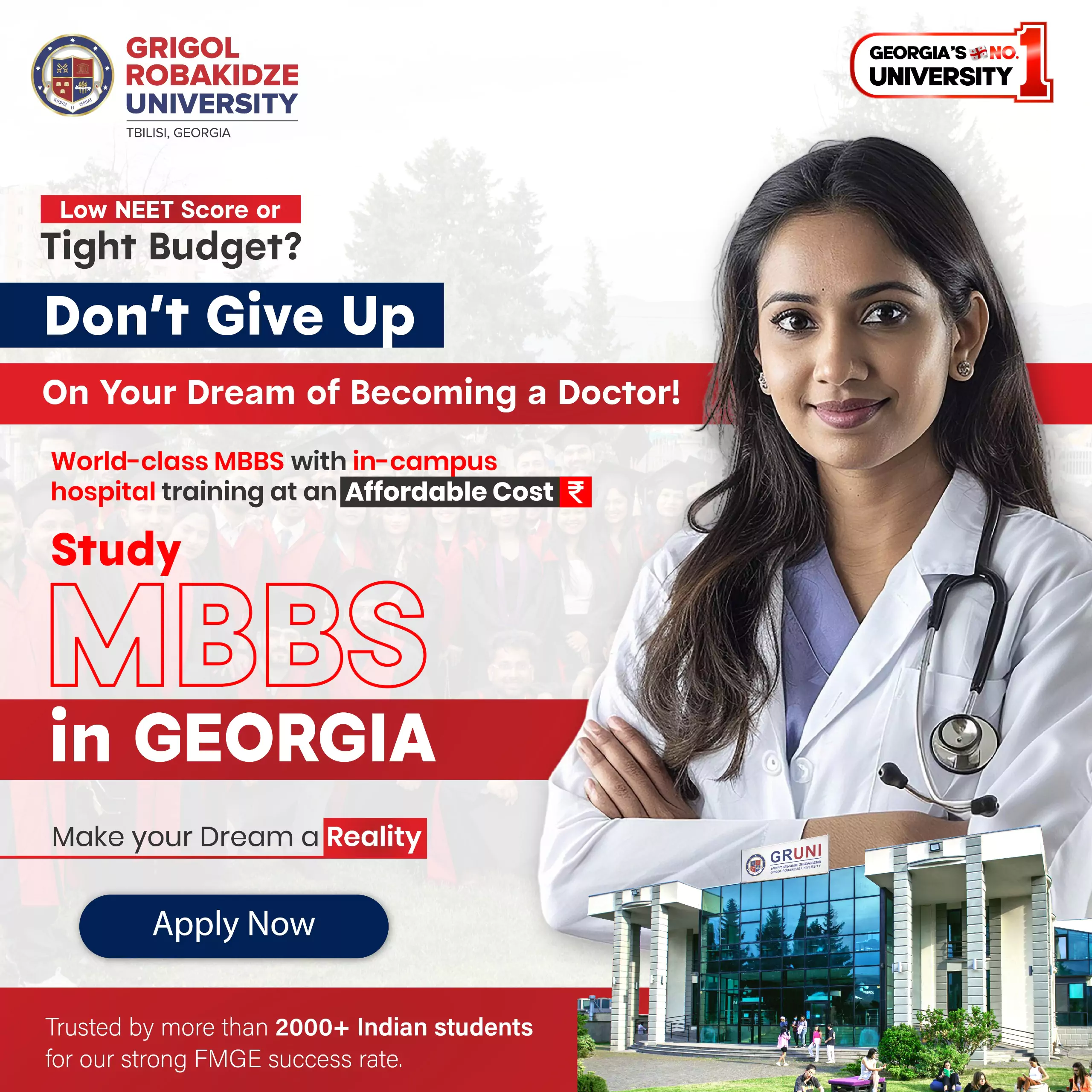Summary: NMC’s FMGL Regulations 2021 enforce strict rules for Indian students studying MBBS abroad. To be eligible for FMGE in India, the degree must be from a WDOMS-listed, locally accredited institution and grant licensure to practice in the country of study. While Georgia offers a 6-year MD program, students must ensure their chosen university fully complies with all NMC guidelines to avoid future ineligibility in India. Learn how Georgia medical universities measure up in 2025.
The National Medical Commission (NMC) has laid down strict guidelines under the FMGL (Foreign Medical Graduate Licentiate) Regulations 2021, which have been actively enforced. These rules are framed to ensure that Indian students pursuing MBBS abroad receive education on par with Indian standards.
Key Highlights:
- Minimum Course Duration: 54 months (4.5 years) of academic study
- Internship Requirement: 12-month compulsory internship in the same country and institution
- Single Country and Institution Rule: No transfers allowed during the course
- Curriculum Equivalence: Subjects and structure must align with the Indian MBBS curriculum
- Medium of Instruction: Preferably English or a language the student is fluent in
- Licensure Abroad: The degree must make the student eligible to practice in the country of education
- WDOMS Listing & Local Accreditation: Mandatory for institution recognition
- NEET Qualification: Mandatory for eligibility to pursue MBBS abroad
NMC Guidelines for MBBS in Georgia
For an MBBS degree from Georgia to be valid in India, it must satisfy all the criteria set by NMC’s regulations (notably the FMGL Regulations 2021). Below are the key requirements:
Subscribe to RM Group of Education Newsletter, Get Admission, Fees, Seats etc.
Key Requirements for MBBS in Georgia
Minimum Course Duration (54 Months)
The foreign medical program must include at least 54 months (4.5 years) of theoretical and practical training. NMC requires a course length comparable to the Indian MBBS.
Mandatory Internship- 12 Months
In addition to 54 months of course, the student must complete a mandatory 12-month internship (clinical rotation) as an integral part of the medical program, and this internship must be done in the Medical Universities of Georgia. NMC regulations explicitly state that the entire medical training and internship should be completed in one continuous stretch at the same university (no transfers or split-country training).
Single Institution/Country for Entire Training
The entire MBBS course and clinical training must be completed in one country and one institution. Students are not allowed to transfer between universities or do part of the course in another country.
Curriculum Equivalence (Subjects and Instruction Medium)
The foreign medical curriculum must be aligned with the Indian MBBS syllabus as per the NMC’s Graduate Medical Education norms. Key subjects like
- Medicine Surgery
- Pediatric
- Obstetrics & Gynecology
- Psychiatry
- Community Medicine
- ENT
- Orthopedics
- Ophthalmology, etc., should all be covered during the course.
NMC has cautioned that attending medical school in a foreign language (e.g. Chinese or Russian, if the student isn’t proficient) can be a major impediment to quality education. Many countries offer English-medium MBBS programs for international students, and Indian students are expected to enrol in those to meet NMC expectations.

World Directory Listing and Accreditation
The medical school must be listed in the World Directory of Medical Schools (WDOMS) and accredited by the local government/education authority. NMC does not “approve” specific colleges abroad, but it requires that the college be a bona fide, recognised institution and follow an NMC-compliant syllabus.
Students should verify that the university is recognised by the country’s regulatory bodies and appears in WDOMS (a global directory), as degrees from unrecognised/unlisted schools will not be accepted.
Most importantly, your primary medical qualification should be valid for practitioner registration in the country of study, which ties into the next point.
Eligibility for Licensure in Country of Study
Perhaps the most critical (and recently emphasised) rule is that the foreign medical graduate must be eligible for a license to practice in the country where they earned the degree.
The NMC regulations state that an FMG must have “registered with the respective professional regulatory body or otherwise, competent to grant a license to practice medicine in the jurisdiction of the country in which the medical degree is awarded, at par with the license to practice medicine given to citizens of that country”.
This means your foreign MD/MBBS should confer the same rights to practice that a local graduate in that country would have. If, for example, local graduates in that country must complete additional steps (like a residency or licensing exam) to practice independently, an Indian student would also need to fulfil those steps to be on equal footing.
This clause is crucial; it has direct implications for graduates from countries where the MD degree alone doesn’t grant full practice rights (we will discuss this in the context of Georgia below).
NEET Qualification
As an eligibility step, Indian students must qualify for the NEET-UG exam (National Eligibility-cum-Entrance Test) before pursuing MBBS abroad. Since 2018, NEET is mandatory for those going abroad; the NEET scorecard effectively serves as the Eligibility Certificate required by NMC for foreign medical admission.
Students must meet the NEET cut-off in the year of admission, and that result is valid for 3 years for the purpose of overseas MBBS enrollment. Those who took admission earlier had to obtain a separate Eligibility Certificate from NMC.
Additionally, students should be at least 17 years old and have completed 10+2 with Physics, Chemistry, Biology/Biotechnology and English, with at least 50% marks, to be eligible for MBBS (same as domestic criteria).
Time Limit to Complete Course (10-Year Cap)
The NMC regulations impose a cap that the entire foreign medical course (including internship) must be completed within 10 years from the date of joining. This is to prevent extremely protracted or inconsistent education.
Typically, an MBBS abroad is 5 to 6 years; NMC allows up to 10 years in case of legitimate delays or additional requirements (some flexibility for double the course duration). However, recent NBEMS exam rules also require that both steps of the licensing exam be passed within 10 years of starting MBBS.
This essentially means students can’t take forever to clear exams or finish training; those who do not complete the process in a decade may lose eligibility.
Screening Exam & Internship in India
Finally, even after earning a foreign degree, an Indian student must pass a screening test in India and undergo a supervised internship in India to register as a medical practitioner.
Clearing FMGE is mandatory for all foreign-trained graduates (there are exemptions only for a few countries like the USA/UK, etc., where no screening is required, but that doesn’t apply to MBBS in Georgia or similar countries).
After passing this exam, the graduate must complete a 12-month Compulsory Rotating Medical Internship (CRMI) in India at an NMC-recognised medical college/hospital. This Indian internship is in addition to the internship done abroad.
The internship in India ensures the doctor is familiar with local healthcare settings. Only after completing this entire process, a foreign degree compliant with NMC, a screening test passed, and an Indian internship, will NMC grant permanent registration to the foreign medical graduate.
Any deviation from these requirements, a shorter course, split program, missing internship, different medium, or lack of licensure abroad, can render the degree unrecognisable in India. The rules are stringent, reflecting NMC’s push to ensure quality and equivalence in foreign medical education.

Georgia’s Compliance with NMC Guidelines
Program Structure in Georgia:
- Degree Awarded: MD (equivalent to MBBS in India)
- Duration: 6 years (including 1 year of internship)
- Credits: 360 ECTS over 12 semesters
- Internship: Conducted in the final year in affiliated hospitals
- Medium of Instruction: English (with Georgian for patient interaction)
- Accreditation: All medical universities must be accredited by Georgia’s NCEQE and listed in WDOMS
FMGE Eligibility for Georgian MBBS Graduates
- FMGE (till 2024): Graduates must meet all FMGL rules to appear for the exam
- NExT (from 2025): Common exam for Indian and foreign graduates; same eligibility rules as FMGE
- Issue: Without Georgian licensure, many students from Georgia are ineligible to take FMGE/NExT
NMC Recognised Medical Universities in Georgia
This is the list of top medical universities in Georgia recognised by the National Medical Commission (NMC).
Grigol Robakidze University (GRUNI), Tbilisi
NMC Approved | High FMGE Success | Ideal for Middle-Class NEET Aspirants
Often called the “dream university” for middle-class Indian students, GRUNI offers:
- 100% English-medium MD program (NMC compliant)
- Clinical exposure from 3rd year with affiliated hospitals
- Modern anatomy labs, libraries, and simulation centers
- Low tuition fees + Indian mess and hostel
- Indian Students Cell + festivals and support
“GRUNI feels like a mini-India with global standards!” – Priyanshu Yadav, 2nd-year student
Tbilisi State Medical University (TSMU)
Georgia’s Oldest & Most Prestigious Public Medical University (Since 1918)
TSMU is the Ivy League of Georgian medicine with:
- Thousands of Indian doctors as proud alumni
- WHO, NMC, ECFMG, FAIMER recognition
- Extensive clinical exposure in government hospitals
- Strong FMGE/NEET PG support system
- High demand – limited hostel seats, apply early!
“TSMU has legacy, structure, and Indian seniors to guide you.”
Read Also: Top 10 Medical Universities in Georgia for Indian Students in 2025
Batumi Shota Rustaveli State University (BSU)
Study MBBS Near the Black Sea
Ideal for students who prefer nature and calm over city life:
- A government university with low tuition
- Beautiful campus in the coastal city of Batumi
- Recognised by NMC, WHO, ECFMG
- Indian food options nearby
- Great for NEET repeaters & budget seekers
“Study medicine while sipping coffee by the sea – only in Batumi!”
New Vision University (NVU), Tbilisi
Tech-Focused Private Medical University
NVU is quickly gaining popularity for its digital-first approach:
- Smart learning with integrated USMLE/NEET PG coaching
- Early clinical exposure
- High-tech anatomy and simulation labs
- Indian hostel & cafeteria + cultural fests
- Excellent hospital tie-ups
“NVU’s tech-savvy system makes learning efficient and clinical-ready.”
Georgian American University (GAU), Tbilisi
- Focus on critical thinking, evidence-based practice
- Excellent teacher-student ratio
- Indian mentors and FMGE guidance
- Growing Indian student community
- Prime location with easy transport access

Comparative Compliance of Georgia with Other Countries
| Country | Duration | Licensure After Degree | NMC-Compliant |
| Russia | 6 years | Yes (after state exam) | Yes |
| Ukraine | 6 years | Yes (pre-war) | Yes |
| Georgia | 6 years | No (needs residency) | Yes |
| Philippines | 4 years MD (after 2 years BS) | Yes (locally) but too short | No |
| Bangladesh | 5+1 years | Yes | Yes |
| Nepal | 4.5+1 years | Yes | Yes |
| Kazakhstan | 5+1 years | Yes | Yes |
Consequences of Non-Compliance
- Ineligibility for FMGE/NExT: Students from non-compliant programs cannot sit for India’s licensing exams
- Degree Not Valid in India: Cannot register or practice as a doctor
- No Indian Internship: Provisional registration denied
- Loss of Time and Money: No ROI on years spent abroad
- Additional Burden: May need to go back for more training or switch careers
Also Read: Best Medical University in Georgia on FMGE Pass Rate [2021–2024 Data]
Advice to Students
- Do not rely solely on education agents or unofficial claims
- Verify NMC compliance of the program personally
- Check the university’s WDOMS listing and local accreditation
- Understand the full licensure path in the country of study
- Ensure the course meets NMC’s duration and structure rules
As of 2025, while Georgia offers a high-quality medical education with a structured 6-year MD program, under NMC’s strict FMGL regulations, this may make them ineligible to appear for FMGE or NExT in India. Unless they also complete additional training in Georgia and obtain a full medical license, their degree may not be recognised in India. Students are advised to perform due diligence before enrolling and consult official resources like the NMC website or the Indian Embassy advisories.




